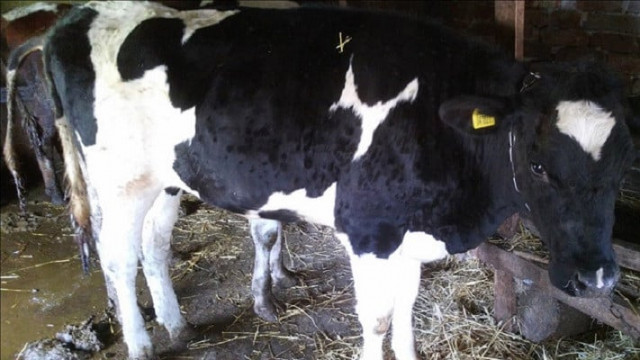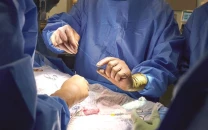Lumpy skin disease on the rise in Mianwali
Vaccine for controlling the virus is unavailable

The spread of lumpy skin disease has intensified in all the areas of the Mianwali district, killing dozens of animals daily and infecting hundreds of others with the disease. This was stated by the Dairy and Cattle Farmers Association of Mianwali through a circular.
However, the vaccine for the disease in the district is unavailable for almost a month. The Livestock Department of Mianwali has sent a request to the director of livestock in Sargodha for 15,000 doses, but a month has elapsed and yet the vaccine has not arrived.
The deputy commissioner of Mianwali was urged to contact the director of the Livestock Department of Sargodha and the secretary of the Livestock Department of Lahore to arrange vaccine for the lumpy skin disease on an emergency basis.
Thousands of animals of poor farmers have already died of this dangerous disease.
Protective sprays used to be given to the farmers. But the supply was stopped four years ago, and it was said that the Department of Livestock did not have stock of those sprays due to which the epidemic was assuming alarming proportions.
The Dairy and Cattle Farmers Association demanded of the Department of Livestock to declare an emergency in Mianwali district, and protective sprays must be provided to the farmers to save the poor people of the district from incurring further losses.
Last month, the lumpy skin virus had spread among cattle in and around Vehari. Hundreds of animals had been affected by the disease, and dozens of them died.
The livestock department claimed to have vaccinated 15,000 animals in the area, but several cattle owners had claimed of unavailability of the vaccine.
A cattle owner, Javed Iqbal, had said the virus had spread in Vehari city and adjoining areas, including Joyanwala, Abbas Town, Bhagwanpura and other villages. He said dozens of animals had been killed due to the virus.
Another local cattle owner alleged that the livestock department had started vaccinating the animals of influential landowners for free, while others were told that the vaccine was not available.
"We have repeatedly asked the officers and doctors of the department to check our animals but they have not come so far," he alleged.
A farmer said the owners were getting their animals vaccinated after paying fees. "Our livelihood depends on animals, but the local administration is not listening to us," he said. The farmers had also revealed that butchers were selling meat of sick animals at low prices.
However, Vehari Livestock Director Rai Zakir Ali said more than 17,000 animals had been vaccinated in the district to prevent the lumpy skin disease.
He had told The Express Tribune that the lumpy skin virus had been found at 20 places in the district.
It is not yet fully understood how the lumpy skin disease virus spreads, and how the skin disease virus is transmitted between animals. The two main routes of transmission are believed to be mechanical transmission via arthropod vectors such as mosquitoes, ticks and flies and the movement of infected animals.
The disease can also spread through fomites in the shape of contaminated equipment and in some cases directly from animal to animal.
Contaminated feed, water and repeated use of needles on different animals can all spread the disease.
The virus is present in large numbers in the skin nodules and scab of infected animals and it can be isolated from blood, saliva, eye and nasal discharge.
Lumpy skin disease virus can be detected in the blood 21 days after infection.
Published in The Express Tribune, July 29th, 2022.



















COMMENTS
Comments are moderated and generally will be posted if they are on-topic and not abusive.
For more information, please see our Comments FAQ